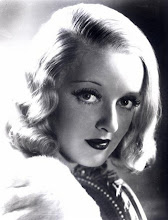Sunday, November 23, 2008
I think I'll have a large order of Prognosis Negative...
The first glimpse I got of Dark Victory was in the documentary Stardust: The Bette Davis Story, which I caught bits and pieces of when it aired on TCM on what would have been Bette Davis' 100th birthday last spring. They showed the clip that begins at about 6:10 in the above video, and I was so intrigued that I stayed up until 4 in the morning to watch the actual film. I managed to catch it a second time recently at a much more decent hour, and am happy to report that it wasn't just sleep deprivation that made me enjoy it so much the first time.
"Miss Judith Traherne of the Sleeping Trahernes" starts out as a spoiled society girl, only concerned with her parties and her horses. Bette Davis does a wonderful job adding layers to what seems at first like a very superficial character, especially when Judith is questioned about her health. She only reveals the extent of her headaches to Ann because she doesn't want her horse to be blamed for her mistake, a detail that suggests early on that there is more to Judy than the simple party girl she appears to be.
A basic premise of the movie -- the doctor and Ann conspiring to keep Judith's true prognosis from her -- may seem absolutely inconceivable to modern audiences. Although both Dr. Steele and Ann's motivations are pure, the good doctor would be breaking almost every medical law on the books if the story were set today. Even knowing that the film was set at a time when patients were routinely lied to "for their own good," it was still kind of hard for me to look past the idea that a dying young woman, especially one so vibrantly and intelligently portrayed, could not handle her own diagnosis.
Of course, she does eventually find out anyway. The scene in which she confronts Ann and Dr. Steele involves everything I love about Bette Davis' performances -- the barely contained anger, the feigned ignorance, and then the dramatic reveal, complete of course with a well-placed glare from those immortal eyes.
A darker side to Judy's character emerges here, as she throws herself into drinking and partying as a response to learning that she's going to die. It takes both the reappearance of Dr. Steele and a well-timed proposition from Humphrey Bogart's stablehand Michael O'Leary for Judith to realize that she needs to make the most of the time she has left.
Judith's reconciliation with Dr. Steele provides her with her "happily ever after," and it almost seems as though the film should end there. Of course, there's still the small matter of Judy's terminal illness to disrupt the idyllic New England home. The final symptom, and the only sign that death is imminent, is the sudden loss of vision. As you can see in the clip above, Judy initially mistakes her dimming vision for a change in the weather. Once she realizes that she is going blind, her focus almost immediately shifts to comforting her friend. It's this show of extraordinary compassion that first drew me to the film, and it's this scene that left a lasting impression on me long after I first saw it.
The final scenes of the movie concern Judith's attempt at hiding her sudden downturn from her husband. One thing that bothered me about this was that neither Ann nor Judith acknowledged that what she was doing -- concealing life-or-death information from Steele for the sake of sparing his feelings -- is exactly what Judith had had done to her earlier in the film. I would have liked to see Ann try harder to talk her into telling Steele, or for Judith to come to a realization about just why Steele and Ann had initially felt the need to "protect" her as they did. Nonetheless, the scenes of Judith groping around blindly to spare her husband the pain of her impending death are extremely poignant.
According to the movie's Trivia page on IMDb, it was originally supposed to end with Judith's much-maligned horse, Challenger, winning the National. I do think the movie is better off ending with Judith's death, but I also found this interesting, particularly because it brings back an element from the very beginning of the movie. It wasn't until the second viewing that I made the connection between Judith's insistance that her horse had courage, and her later insistance that she herself had to have the courage to die alone.
The next airdate for Dark Victory on TCM is listed as February 25th. If you don't want to wait that long, it's up in its entirety on YouTube, split into 11 parts. Either way, it's definitely something I would recommend watching.
Subscribe to:
Post Comments (Atom)


I found Dark Victory hard to watch. I don't think I'll see it again, but it is a film I look back on fondly.
ReplyDeleteThe whole pride thing bothered me too. Why couldn't she just accept it?
This is on DVD too!